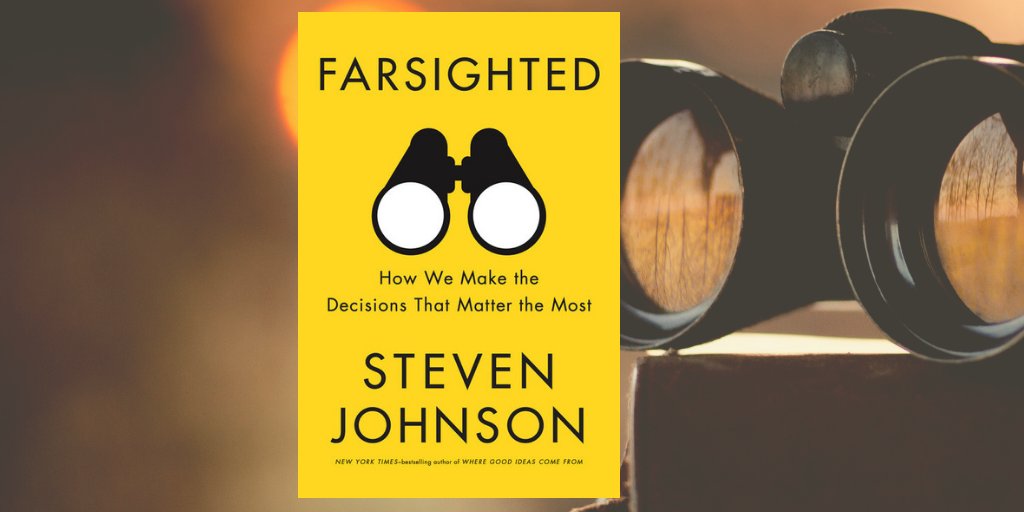this is my first book report.

It’s fitting that it is a book by Steven Johnson. He wrote a book called Where Good Ideas Come From that had a huge impact on me a few years ago. Some of Johnson’s writing can get intense, and you have to trudge through it, but overall the subject matter was pretty solid in this book. It’s called Farsighted and I thought it was pretty recent but apparently it has been out for over two years now (September 4, 2018). I got the hardback so I just assume it must be really new but I’m way behind the gun on book releases, even authors that I think are cool. Johnson had a Netflix special for Where Good Ideas Come From but I got a little bored throughout it — was just a little too PBS for me (which I think it might have been made for/by).
I made a lot of notes in this book, but I realize that I don’t really care to go super-deep into this. Really, I just wanted to signal to myself via a blogpost that I actually finished a book. This is book 1 of my new resolution to not just start five million books but actually try to finish them and be mindful about implementing the lessons. I’ll be posting quick reflections as I finish really just to keep track of what I’ve tackled.
The huge lesson here, without going too deep into detail, is to keep your eye on the longview. Johnson makes a really strong argument — the same way he did in Where Good Ideas Come From — about how schools curriculums should be built around more applicable “core” subjects. He suggests “decision-making” should be a core subject. I like his way of thinking about school subjects, in fact, he spurred me to think through a whole curriculum that is re-oriented around subjects that are more organically multi-disciplinary. A course on decision-making could have all sorts of examples, from history / technology / literature / pop culture. The decisions could, as Johnson’s book covers, be professional or personal.
In this way of thinking, I began to think about subjects like “decision-making” and “innovation” as the equivalent to powerlifts for the body. When the importance of powerlifts was being explained to me, I was told that it had to do with engaging entire muscle groups or often multiple muscle groups. It isn’t just a bicep curl isolating a few particular tissues, instead you are flinging some weight from the ground using your legs and up over your head using almost your entire upper body. I began to think of Johnson’s proposed subjects as “pedagogical powerlifts” upon which an entire curriculum could stem.
These subjects would make it easier to connect stories/facts across multiple domains — math, science, history, art — rather than only studying the parts of a subject that make any sense in isolation. I was on the more intelligent side of my classmates growing up, and there were many times particularly in chemistry and biology where I truly had no idea how to explain in simple terms what hyper-specific set of vocabulary we were using. I would just get completely lost for weeks on end. Maybe this is my own defect, but if I would be studying how a surgeon made a life-changing decision and what the physiological effects could have been on his patient had he chosen a different course, and then extrapolated how and why and how and why and asked questions and imagined that scenario myself, now that sounds like a learning experience.
I have the book sitting next to me, I just don’t feel like flipping through it right now. I finished it a couple days ago and I hope in the future I throw a few more quotes into these and maybe they can be a bit more professional, but for now I’m kind of just happy I finished the thing after so many unfinished books have been started in the last couple of years.
I love that the book really culminates in Johnson extolling the virtues of fiction-reading. It makes people understand how stories work better, and that helps them understand how to visualize problems and make decisions. He has so many good quotes on this throughout those final few chapters that it makes the whole book worth it. I am trying to write a lot more fiction recently, so seeing the importance Johnson places on how fiction has such a profound power to help shape our decision-making heuristics.
One thing that I just noted is that it seems like Nassim Taleb could have been mentioned. I don’t know why exactly, Johnson and Taleb just seem to be interested in similar subjects. Antifragile hit me pretty hard a few years ago and this book nudged me in a similar direction.
I believe it was Johnson’s WGICF that introduced to me the phrase “the adjacent possible” and this book definitely reminded me of that profound thought. The idea is that innovators are often able to see the potential lateral improvements / iterations that might otherwise seem to trivial or simple to be interesting for the traditional institution. The Old School tends to focus on the incremental improvements and misses the other possibilities. There is an echo of those lessons in here. Innovation comes from the outsiders was another lesson from that book that stuck with me; Farsighted makes a similar argument for the importance of collecting diverse perspectives when faced with challenging decisions.
I would overall recommend this book if you are into this sort of thing. Johnson has found a sweet spot in this kind of business / education / self-help category. That isn’t even a fair characterization, but the inspiration is valuable and I appreciate this book and am grateful that Steven Johnson put it out there.
It is difficult to keep your eye on the long view, but I have been learning powerful lessons lately in my own life about this. Today, I found a copy of The Whole Earth Epilog at a used bookstore in a smalltown about twenty miles from where I live. I paid five dollars for it, and the cheapest version I see online is 99 bucks. That doesn’t have anything to do with the lessons I have been learning lately, but Stewart Brand was the originator of the Whole Earth Catalog and Johnson mentions him a few times in regard to his Long View conversations. The Long Now is Stewart Brand’s organization and they have posted some great podcasts if you are interested.
I give Farsighted by Steven Johnson 7 out of 10 chili peppers. Definitely Recommend, but I’m not too bright so it gets tough at points. I learned a lot about myself reading this.
🌶 🌶 🌶 🌶 🌶 🌶 🌶
